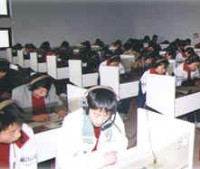 Children in China, especially those in rural areas, have got more access to education than their parents ever had due to the nation's unswerving implementation of the family planning policy.
Children in China, especially those in rural areas, have got more access to education than their parents ever had due to the nation's unswerving implementation of the family planning policy.
Statistics from the educational authority of Henan, a central China province with the largest population, show that the number of the school-age children has been dropping since 1996. The number of primary school students in the province is expected to drop from 11.3 million in 2000 to 8.3 million in 2005.
Analysts said that the dramatic cut in the number of newborns has made it possible for the nation to better its educational services and optimize educational resources.
In early September when the autumn semester started, the educational department of Henan Province began to amalgamate those primary schools whose enrollments were far below their projected number.
In the past, the scene of 70 to 80 students packed into one classroom was not uncommon in Henan.
To meet the then soaring demand for education, the province mapped out a school quota which required every 15,000 population to have a middle school and every primary school in the plain region be built to serve people living within a distance of 1.5 km. As a result, by 2000, nearly 40,000 primary schools were scattered in the province's rural areas.
According to the figures collected in the nation's fifth census, 85 percent of the province's population had received schooling no lower than primary level in 2000, 16 percentage points higher than 1990.
Liu Junzhe, an expert on demography, said, "the positive effect of population control is telling on the country's juvenile education."
Nationwide, 85 percent of Chinese had received the nine-year compulsory education in 2000, while some 99.1 percent of school aged children were enrolled.
Implemented in the 1970s, the family-planing policy, which advocates one-child family, has effectively curbed the nation's rapid population growth. In the late 1990s, China began to witness a low birthrate, a low mortality and a low growth rate.
In rural China where the family control policy was hard to implement because most farmers habitually wanted to have as many children as possible, a silent change is taking place.
Most farmers now prefer one well-educated child to many poorly educated kids. The size of a family doesn't matter any more as the nation's future development hinges more upon science and technology.
Qin Jinquan, a farmer who has seven siblings but only one son, said that he hopes his son can get into college.
Qin couldn't complete primary school when he was a child because there were too many kids waiting to be fed by his parents.
Specializing in the transportation business, Qin makes an annual income of more than 20,000 yuan (US$2,400).
Like many parents in rural China, Qin would like to invest as much as possible in his child's education, including employing a tutor or buying a musical instrument.
As rural China's education service constantly improves and farmers' education awareness gets stronger, experts believe that more talented people will be cultivated and the prosperity of China is just around the corner.
(Xinhua News Agency 10/19/2001)
